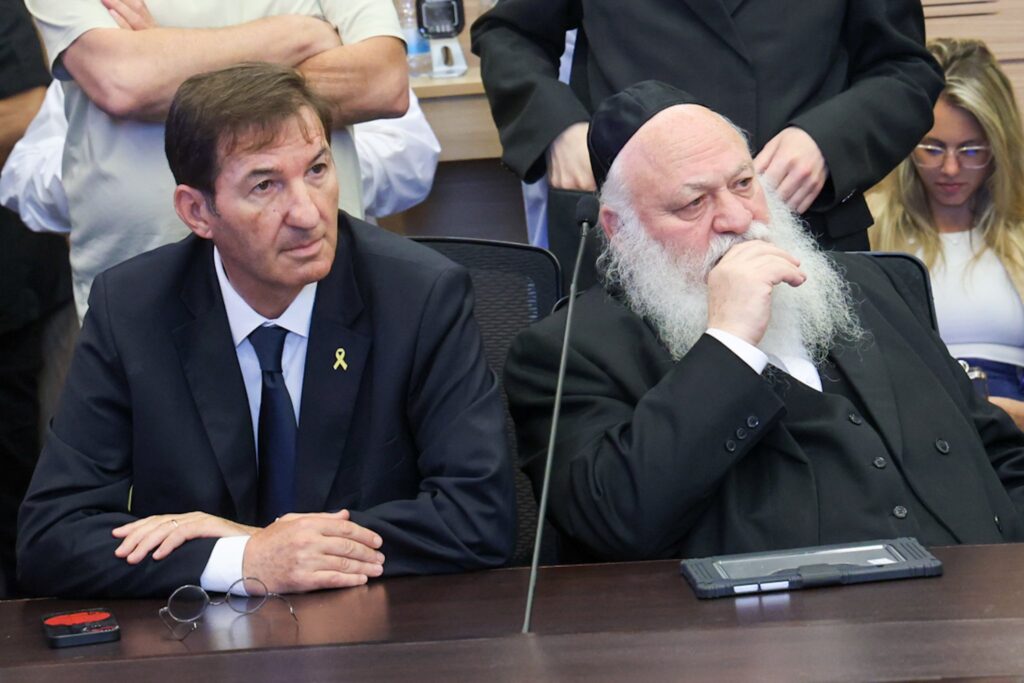NepalIsrael.com auto goggle feed
Knesset Foreign Affairs and Defense Committee chairman Boaz Bismuth released on Thursday his long-awaited revision of a government-backed bill regulating ultra-Orthodox enlistment, paving the way for its continued advancement toward the final two readings necessary for it to become law.
Bismuth’s version of the legislation would continue to grant military service exemptions to full-time yeshiva students while ostensibly increasing conscription among graduates of Haredi educational institutions.
However, the proposed legislation removes various provisions from a previous draft that were intended to ensure that those registered for yeshiva study are actually studying, and cancels all sanctions on draft evaders when they turn 26. Many ultra-Orthodox young men are widely believed to register for yeshiva but not actually study, the yeshiva is funded for their ostensible presence, and the young men evade military service.
The release of the draft text sparked harsh criticism from the opposition, mainly because it was seen as calibrated to maintain the current status quo, under which the overwhelming majority of ultra-Orthodox men do not perform IDF service. Opposition Leader Yair Lapid dismissed it as an “anti-Zionist disgrace,” and Bismuth’s Likud predecessor as Defense Committee chair, Yuli Edelstein, called it “a political band-aid.”
A defense official was quoted Thursday evening as saying that the bill leaves “the exemption mechanism in the hands of the rabbis and not the IDF,” and that it would not bring much-needed recruits from the ultra-Orthodox community into the military. “This law is essentially a bluff,” the official told Channel 12 news.
The new version of the legislation is likely to face a significant challenge before the High Court, which struck down the previous law in 2017 and last year ordered the government to begin drafting Haredi men into the IDF.
In response to the critics, Bismuth released a video in which he boasted that he had written a “balanced law” that was “good for the army” as well as yeshiva students.
Pushing back on the widespread belief that the coalition was set on advancing the law in order to bring the ultra-Orthodox Shas and United Torah Judaism parties back into the government, Bismuth insisted that his proposal was “not here to stabilize a coalition, it’s here to stabilize the state.”
Prime Minister Benjamin Netanyahu, who has been seeking to advance the legislation in order to satisfy the ultra-Orthodox parties’ demands but is also wary of alienating other supporters, did not comment on the revised text on Thursday. People close to Netanyahu were quoted in multiple Hebrew media reports, however, calling the draft legislation “unprecedented since the foundation of the state,” claiming that it would see the conscription of 23,000 ultra-Orthodox men within three-and-a-half years, and asserting that it features hard-hitting sanctions should its targets not be met. “It’s an excellent law,” the unnamed people said, “and it will pass.”
The bill states that its goal is to “regulate the status of full-time yeshiva students while recognizing the importance of Torah study.” However, while it asserts that it aims to “reduce inequality in conscription for regular military service, including through the integration of members of the Haredi public into civil-security service,” it also states that full-time yeshiva students who do not engage in any other vocation can be granted yearly deferments from enlistment.
For the past year, the Haredi leadership has pushed to pass a law largely keeping its constituency out of the Israel Defense Forces, after the High Court ruled that decades-long blanket exemptions from army duty traditionally afforded to full-time Haredi yeshiva students were illegal.
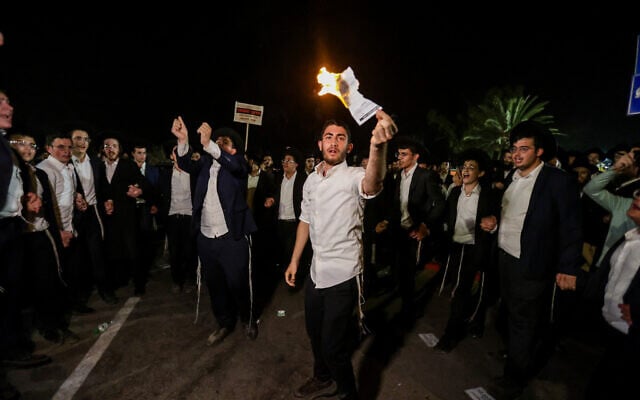
Some 80,000 ultra-Orthodox men aged between 18 and 24 are currently believed to be eligible for military service, but have not enlisted. The IDF has said it urgently needs 12,000 recruits due to the strain on standing and reserve forces caused by the war against Hamas in Gaza and other military challenges.
A long-delayed bill
Bismuth took over the Foreign Affairs and Defense Committee and responsibility for the bill in August, following the removal of his predecessor, Edelstein, whose own proposed draft was too harsh for the Haredim, causing them to bolt the government.
After taking over the committee, Bismuth largely threw out Edelstein’s work and started over, indicating that his revised legislation would continue to exempt full-time yeshiva students from IDF service for the foreseeable future, and would draft only half of the eligible members of the community not engaged in full-time Talmud study, gradually, over the next five years.
However, despite Bismuth announcing in October that he would soon submit a revised draft of the bill to the committee, with the intention of bringing it to a final plenum vote in December, the legislation’s progress was subsequently marked by repeated delays caused by ultra-Orthodox intransigence and internal opposition to the bill within the coalition.
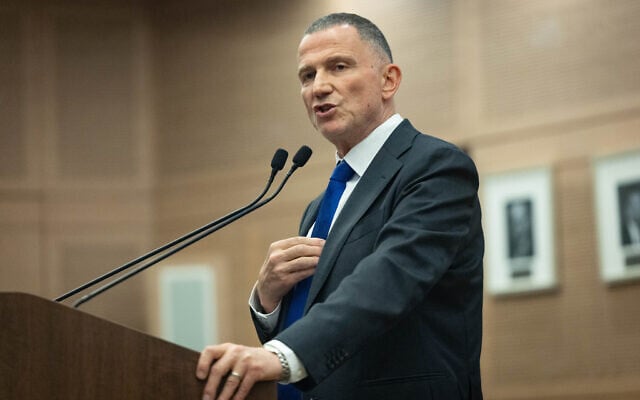
However, things began to change last week when the United Torah Judaism party’s Degel HaTorah faction announced that it supported the bill, leading Netanyahu to reportedly give Bismuth a green light to schedule new hearings to prepare it for its second and third readings in the plenum.
Three discussions on the bill are scheduled for the committee next week, Bismuth announced on Thursday.
Removing oversight
The bill appears to have softened or removed multiple provisions from Edelstein’s previous draft, including clauses for providing oversight of yeshiva attendance, such as the implementation of fingerprint scanners in yeshivas.
Students who receive deferment orders may be allowed, upon reaching the age of 20, to request a civilian security service.
Striking out part of a clause from a previous version that stated that the government would recruit conscripts from among yeshiva students, the updated bill stipulates that the government will recruit them from among graduates of Haredi educational institutions, and says the recruits will perform military service or civilian security service, in accordance with annual minimal thresholds.
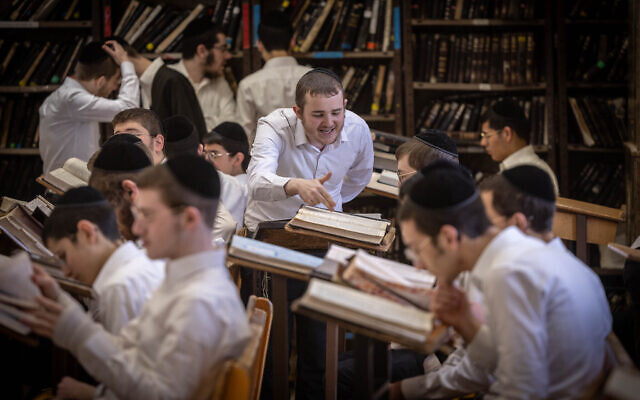
The bill lists these thresholds as 8,160 conscripts in the first year; 6,840 in the second; 7,920 in the third; 8,500 in the fourth; and “no less than 50 percent of the annual enlistment cohort from graduates of Haredi educational institutions” in the fifth year.
After the fifth year, the defense minister will be empowered, with the Foreign Affairs and Defense Committee’s approval, to set an annual minimum threshold no lower than that of the fifth year.
This minimum threshold will also include those performing non-military security services, although this group will be capped at 10% of the total.
For the purposes of the law, Haredim will be defined as those who studied at a Haredi educational institution for at least two years between the ages of 14 and 18.
Failure to meet recruitment targets will mean the withdrawal of funding for yeshiva students enjoying deferrals.
Any yeshiva students who have not received an exemption and did not report for service will not be allowed to get a driver’s license until the age of 23, unless allowed by an exceptions committee, and will be ineligible for academic scholarships.
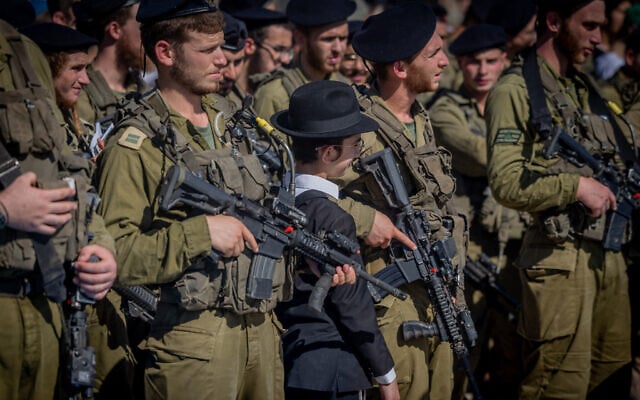
They will also be banned from traveling abroad until the age of 23, unless otherwise allowed by an exceptions committee, and “shall not be eligible to participate in the subsidized public-housing program” or receive tax credits, national insurance discounts, daycare subsidies or transit discounts.
The sanctions will not apply after a yeshiva student reaches the age of exemption, which is set at 26.
Should the law fail to lead to the conscription of 95% its target for three consecutive years, the defense minister will establish a committee to examine the matter in order to issue recommendations for the implementation of the law and proposals for legislative amendments.
The bill further stipulates that the IDF will work to “enable the preservation” of Haredi recruits’ lifestyle while simultaneously working “to establish service tracks that are tailored to the lifestyles of graduates of Haredi educational institutions, and to expand such tracks, taking into account the minimum threshold for enlistment in each enlistment year.”
The IDF chief of staff will be required to report four times a year on the implementation of these efforts and create an advisory committee, some of whose members must have a yeshiva background, to deal with the issue. The Defense Ministry will also work to establish Haredi pre-military preparatory academies.
The ultra-Orthodox Shas party did not respond publicly to Bismuth’s announcement, although a senior party official recently told The Times of Israel that Shas had “signaled a long time ago that it is in favor.”
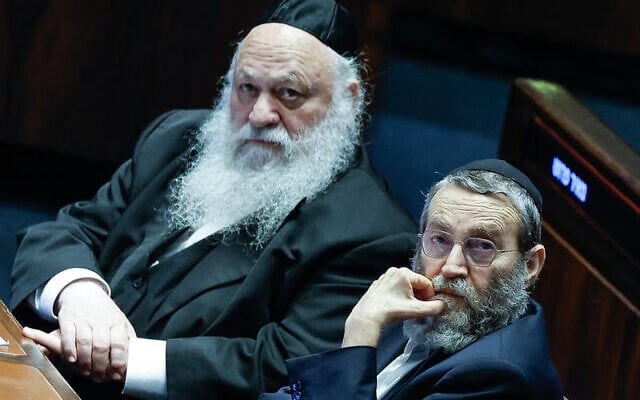
UTJ chairman Yitzhak Goldknopf, who heads the party’s Hasidic Agudat Yisrael faction, said that his party’s rabbinic leadership will examine the new draft before deciding on whether or not to support it.
“The position of the Council of Torah Sages, as conveyed to us, is that we must advance a framework that will preserve the world of Torah, without any sanctions against Torah students,” he said.
“The draft proposal presented this evening will be brought before our revered Torah sages, may they live long, for their decision, and we will act solely according to their guidance.”
‘An anti-Zionist disgrace’
Bismuth’s revision sparked immediate condemnations from members of the opposition and wider anti-Netanyahu bloc.
“We cannot allow this anti-Zionist disgrace to pass. We cannot allow them to humiliate the fighters, the wounded and the dead like this,” declared Lapid.
“This is not a law,” he said. “It’s pathetic politics by corrupt people and draft-dodgers at the expense of our children. It won’t happen, it will not pass, it will not succeed.”

Former prime minister Naftali Bennett called Bismuth’s proposal “the most anti-Zionist law enacted in the history of the state,” arguing that it constituted “a declaration of war by the government on every reservist, every IDF soldier, and the entire serving public.”
Blue and White chairman and former IDF chief of staff Benny Gantz called the bill an “autoimmune disease” in which the state is “attacking its own security” while the hawkish Yisrael Beytenu party, led by Avigdor Liberman, said that “the real right doesn’t support the evasion law.”
For his part, Edelstein insisted that “unlike the text I put forward, this proposed law does not answer the IDF’s needs, in any way.”
Instead, it is “another political band-aid instead of a historic law,” he added, pledging to “fight until the end for a real draft law.”
Multiple coalition lawmakers have previously expressed opposition to the legislation as currently written, with Likud MK Moshe Saada recently calling its proposed sanctions for draft evaders toothless.
Addressing a conference of reservists earlier this month, Deputy Foreign Minister Sharren Haskel (New Hope) said that she knew of six other coalition legislators who planned on voting against the bill.
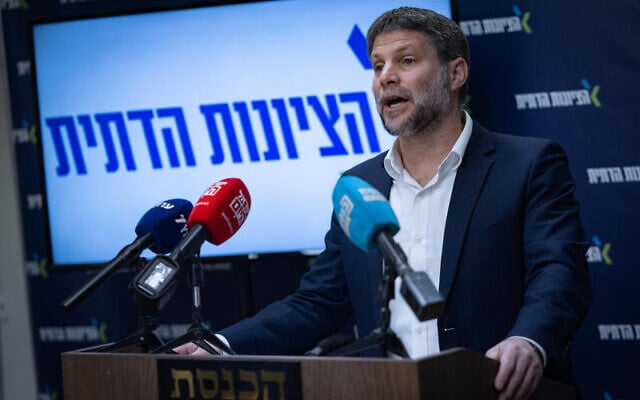
Likud MK Dan Illouz, a vocal critic of the legislation, tweeted on Thursday evening that he was still examining Bismuth’s draft but added that “the Likud must represent the serving public that elects it to the Knesset according to the party’s national-liberal outlook.”
In a statement, Finance Minister Bezalel Smotrich’s Religious Zionism party announced that it was also currently examining Bismuth’s bill.
“Our principle has been and remains: We will only vote for a law that will lead to real and rapid recruitment of Haredim into the IDF to meet security needs and ease the burden on fighters, reservists, and their families,” the party said.
The post”Bismuth presents bill exempting yeshiva students from IDF draft, loosening sanctions” is auto generated by Nepalisrael.com’s Auto feed for the information purpose. [/gpt3]



